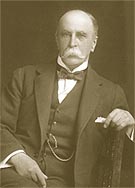Honouring Osler
 This year, McGill honours one of the most prominent physicians of the modern age, Sir William Osler, MDCM1872, in celebration of the 150th anniversary of his birth. The renowned medical educator changed the way medicine was taught, emphasizing bedside teaching -- a previously unheard of concept -- and listening carefully to the patient. He helped create a model for postgraduate training for physicians that is still followed today. Osler's The Principles and Practice of Medicine, published in 1892, was the definitive medical teaching volume for over 30 years. He taught at McGill for a decade before moving on to the University of Pennsylvania, Johns Hopkins, and finally Oxford. Despite such changes, Osler's bond with McGill remained strong, and he continued to take an active role in the organization of McGill's Faculty of Medicine. This year, McGill honours one of the most prominent physicians of the modern age, Sir William Osler, MDCM1872, in celebration of the 150th anniversary of his birth. The renowned medical educator changed the way medicine was taught, emphasizing bedside teaching -- a previously unheard of concept -- and listening carefully to the patient. He helped create a model for postgraduate training for physicians that is still followed today. Osler's The Principles and Practice of Medicine, published in 1892, was the definitive medical teaching volume for over 30 years. He taught at McGill for a decade before moving on to the University of Pennsylvania, Johns Hopkins, and finally Oxford. Despite such changes, Osler's bond with McGill remained strong, and he continued to take an active role in the organization of McGill's Faculty of Medicine.
One of Osler's greatest gifts to McGill was the donation of his personal library to the University upon his death. He had been an enthusiastic book collector, and his bequest of over 8,000 titles established the Osler Library of Medicine in 1929. "To study the phenomena of disease without books is to sail an uncharted sea," he said, "while to study books without patients is not to go to sea at all."
Marking the sesquicentennial are a number of special events and exhibitions. The main exhibition can be seen at the Redpath Museum. Osler's McGill: Medical Education, 1870-1885, illustrates the life of a medical student in Osler's day using books, medical equipment, photos and pathological specimens, including a preserved human heart prepared by Osler.
The City of Montreal has also approved the renaming of the top of Drummond Street above Dr. Penfield, where much of McGill's Faculty of Medicine is housed, to Promenade Sir William Osler. |
Star treks back to McGill
 As Captain James T. Kirk of the Starship Enterprise, William Shatner boldly went all over the galaxy, but it wasn't until March of this year that he visited McGill for the first time since his graduation in 1952. Accompanied by a crew from CBC Television's Life and Times, who were filming a documentary about him, the actor took a nostalgic tour of the campus. As Captain James T. Kirk of the Starship Enterprise, William Shatner boldly went all over the galaxy, but it wasn't until March of this year that he visited McGill for the first time since his graduation in 1952. Accompanied by a crew from CBC Television's Life and Times, who were filming a documentary about him, the actor took a nostalgic tour of the campus.
Standing on stage at Moyse Hall, McGill's theatre in the Arts building, Shatner recalled his earliest acting experiences. The Montreal native remembers having little time for his lectures and laughed sheepishly about barely passing his courses. One thing he did learn, he said, was "how much energy it takes to put on a show."
During his years as a Management student, Shatner was a performer in the Red and White Revue, the Player's Drama Club and the Radio Workshop. All that experience taught him "the joy of entertaining, the mechanics of production, how to have empathy to fear and how to enjoy and appreciate talent." He added philosophically, "It's not difficult to be a failure...(The) extraordinary feeling of success is much more rare than failure."
Success for Shatner certainly didn't come right away. After graduating from McGill, his first job was in a summer theatre at Beaver Lake on Mount Royal. Ironically, he got the job as a result of his BCom degree -- he was hired to do the books.
Shatner and the Life and Times crew headed next to the Student Union building on McTavish Street, unofficially renamed the "William Shatner University Centre" by students following a campus referendum in 1993. (To have a building named for them officially, benefactors are expected to contribute at least half of the cost of construction.)
The actor was swarmed by various McGill media representatives and Star Trek fans, all eager to find out his reaction to seeing the 1960s-era Shatner building for the first time. Despite the building's slightly dilapidated state, Shatner said that it meant a lot to him to be associated with the students' "centre." He added somewhat cryptically, "My centre is not Montreal, but I'm from Montreal. I am made up of English solidity and French flamboyance." While his audience thought that over, Duncan Reid, President of the Students' Society, unfurled plans for renovations to the building. Said Shatner, taking his cue like a pro, "The magic words are: how can I help?"
Summing up his feelings about the day, Shatner said, "I have many fond memories of McGill," and added that he felt "an incredulity at the passage of time -- so much time and so quickly."
The episode of Life and Times featuring William Shatner is due to air in the fall.
|
Travel bug
Those whiney mosquitoes that find you just as you're falling asleep are annoying, but the ones that bite you on vacation may actually kill you.
Dr. J.D. MacLean, director of the McGill Centre for Tropical Diseases at the Montreal General Hospital, says Canadians travelling to tropical countries are being too careless about the health risks of diseases like malaria and dengue fever. In a recent interview in the National Post, MacLean reported that in 1997, malaria among Canadians increased by an astonishing 234%, and most of those cases were preventable.
"If the (anti-malarial) medicine is taken properly and correctly, it gives 95% protection," MacLean told the Post. "We know what causes malaria, we know how to avoid it, and we know why people die from malaria. But we don't know how to get people to take their pills," he added. If the disease doesn't prove fatal, it can be persistent, with episodes of flu-like symptoms recurring for years.
You don't have to travel far to be at risk -- infected mosquitoes can be found in destinations as close as Central America and the Caribbean. If you are prescribed medicine for malaria, take it all, advises MacLean. Side effects may include nausea, but it sure beats the alternative.
|
Cloning get your goat

Former McGill genetics professor Jeffrey Turner and his company, Nexia Biotechnologies Inc., announced that they have cloned triplet goats, which have been living at Macdonald Campus since their birth in March. These kids -- named Clint, Arnold and Danny -- haven't been cloned for goat cheese or the barbecue: Nexia is planning to use goats in the production of BioSteel, an artificial spider silk. With a tensile strength of 300,000 pounds per square inch, BioSteel is the strongest substance known to man. Turner recently appeared before a parliamentary committee examining biotechnology in agriculture and explained that awesome strength: "To put that into something you can understand: a cable the size of my thumb would be able to stop a jumbo jet in flight."
The artificial spider silk is environmentally friendly and compatible with human tissue, and could be used in sutures, tissue repair, artificial tendons and ligaments, as well as bullet-proof vests and the construction of space stations. The silk would be produced in the goat's milk, though Nexia has yet to introduce the spider gene to the goats, the crucial next step. The transgenic goats would then reproduce with ordinary goats, and their offspring would produce the spider silk when they lactated.
All of this fooling with Mother Nature has some ethicists concerned, and biotechnology's Frankenstein-like image is the reason for the parliamentary committee, as more and more people worry about genetically altered food, super-animals, and the possibility of cloned humans.
Next up for Nexia, a cloned sheep with the spider silk gene. Steel wool?
|
Winners all round
 McGill Librarian Barbara Finlay, MLS'75, got quite a surprise in April when Faculty and Staff Annual Fund Chairs Jim Ramsay and Robyn Wiltshire burst into her office with balloons, champagne, and the news that she had won the grand prize in the Faculty and Staff Giving Giveaway. Finlay now has an endowed student prize worth approximately $500 a year named after her. The wacky fundraising campaign featured Publisher's Clearinghouse-type promotional letters and "scratch and share" cards that added to donors' gifts. The unconventional approach was a great success, with the number of donors up by 50% and contributions by $15,000. Finlay was able to choose the department that will benefit, and decided that the Barbara Finlay Prize for Exceptional Academic Merit should be awarded each year to a student in library science. McGill Librarian Barbara Finlay, MLS'75, got quite a surprise in April when Faculty and Staff Annual Fund Chairs Jim Ramsay and Robyn Wiltshire burst into her office with balloons, champagne, and the news that she had won the grand prize in the Faculty and Staff Giving Giveaway. Finlay now has an endowed student prize worth approximately $500 a year named after her. The wacky fundraising campaign featured Publisher's Clearinghouse-type promotional letters and "scratch and share" cards that added to donors' gifts. The unconventional approach was a great success, with the number of donors up by 50% and contributions by $15,000. Finlay was able to choose the department that will benefit, and decided that the Barbara Finlay Prize for Exceptional Academic Merit should be awarded each year to a student in library science.
|
|